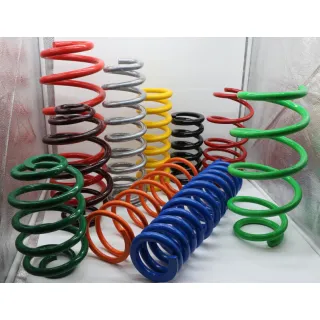The Role of Heavy-Duty Tension Springs in Machinery Applications
Heavy-duty tension springs play a critical role in various industrial machinery applications, providing reliable force and tension to support the operation of heavy equipment. These springs are designed to withstand substantial loads and deliver consistent performance in demanding industrial environments. Here is an overview of heavy-duty tension springs for industrial machinery:
Characteristics and Features:
High Load Capacity:
Heavy-duty tension springs are engineered to handle substantial loads, making them suitable for applications where significant force is required.
Durable Materials:
These springs are typically constructed from durable materials such as high-strength alloys or corrosion-resistant steels. The choice of materials depends on the specific requirements of the industrial application.
Precision Engineering:
Precision engineering ensures that heavy-duty tension springs are manufactured with tight tolerances to meet exact specifications. This precision is crucial for consistent performance and reliability.
Coating Options:
To enhance durability and resistance to environmental factors, heavy-duty tension springs may be coated with protective finishes. Common coatings include zinc plating, powder coating, or other corrosion-resistant treatments.
Customization:
Manufacturers often offer customization options to meet the unique needs of different industrial machinery applications. This includes variations in size, load capacity, and end configurations.
Wide Range of Applications:
Heavy-duty tension springs find application in various industrial sectors, including automotive, construction, mining, agriculture, and manufacturing. They are used in equipment such as presses, conveyors, crushers, and other heavy machinery.
Extended Service Life:
The robust construction and quality materials used in heavy-duty tension springs contribute to their extended service life. This is crucial for minimizing downtime and maintenance costs in industrial settings.

Resistance to Fatigue:
These springs are designed to resist fatigue, ensuring that they can withstand repeated cycles of tension and compression without experiencing a decline in performance.
Applications in Industrial Machinery:
Conveyor Systems:
Heavy-duty tension springs are employed in conveyor systems to provide tension for belts and chains, ensuring smooth and efficient material handling.
Presses and Stamping Equipment:
Industrial presses and stamping machines use tension springs to provide the necessary force for metal forming and shaping processes.
Crushers and Crushers:
In mining and construction equipment, tension springs are utilized to control the movement of crushers and screens, contributing to efficient material processing.
Agricultural Machinery:
Heavy-duty tension springs are integral components in agricultural machinery such as plows, tillers, and seeding equipment, where they assist in controlling various moving parts.
Heavy Machinery Attachments:
Attachments on heavy machinery, including buckets, blades, and grapples, often rely on tension springs to provide the force needed for effective operation.
Oil and Gas Equipment:
In the oil and gas industry, heavy-duty tension springs are utilized in equipment such as drilling rigs, wellhead components, and offshore platforms.
Manufacturing Equipment:
Various types of manufacturing machinery, including stamping presses, injection molding machines, and metal forming equipment, use tension springs to control movements and forces during the manufacturing process.
Considerations for Selection:
Load Requirements:
Choose heavy-duty tension springs based on the specific load requirements of the industrial application. The spring must be capable of providing the necessary force without deformation.
Size and Dimensions:
Consider the size and dimensions of the tension spring to ensure proper fit within the machinery. Customization options are often available to match specific space constraints.
Material Compatibility:
Select materials that are compatible with the operating environment of the machinery. Corrosion resistance may be essential in harsh or outdoor conditions.
Environmental Factors:
Evaluate environmental factors such as temperature, humidity, and exposure to chemicals, as these can impact the performance and longevity of the tension springs.
Maintenance Requirements:
Consider the maintenance requirements of the tension springs. Choosing high-quality, durable springs can reduce the frequency of maintenance and replacement.
In summary, heavy-duty tension springs for industrial machinery are essential components that provide reliable force and tension, contributing to the proper functioning of heavy equipment across various industrial sectors. Their robust construction, precision engineering, and customization options make them integral to the performance and efficiency of industrial machinery applications.


